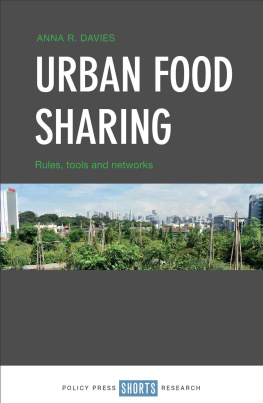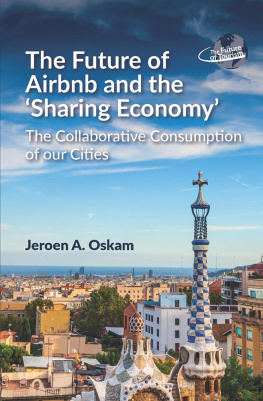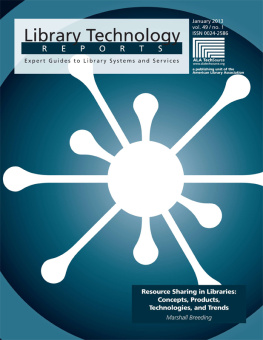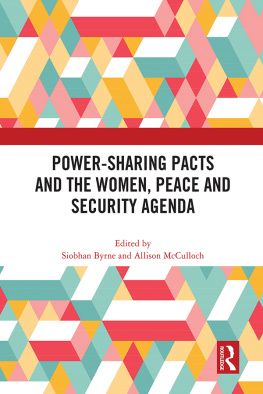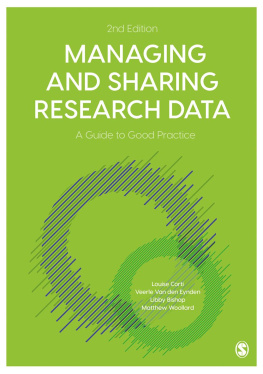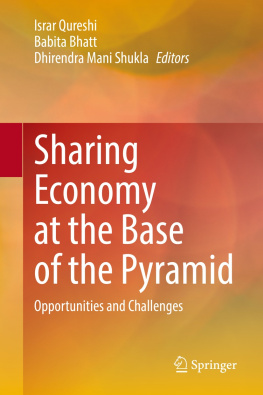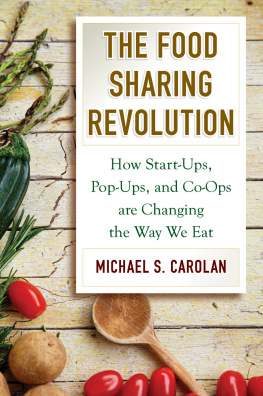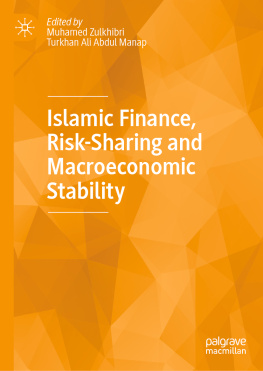Anna Davies - Urban Food Sharing: Rules, Tools and Networks
Here you can read online Anna Davies - Urban Food Sharing: Rules, Tools and Networks full text of the book (entire story) in english for free. Download pdf and epub, get meaning, cover and reviews about this ebook. year: 2019, publisher: Policy Press, genre: Children. Description of the work, (preface) as well as reviews are available. Best literature library LitArk.com created for fans of good reading and offers a wide selection of genres:
Romance novel
Science fiction
Adventure
Detective
Science
History
Home and family
Prose
Art
Politics
Computer
Non-fiction
Religion
Business
Children
Humor
Choose a favorite category and find really read worthwhile books. Enjoy immersion in the world of imagination, feel the emotions of the characters or learn something new for yourself, make an fascinating discovery.
- Book:Urban Food Sharing: Rules, Tools and Networks
- Author:
- Publisher:Policy Press
- Genre:
- Year:2019
- Rating:5 / 5
- Favourites:Add to favourites
- Your mark:
- 100
- 1
- 2
- 3
- 4
- 5
Urban Food Sharing: Rules, Tools and Networks: summary, description and annotation
We offer to read an annotation, description, summary or preface (depends on what the author of the book "Urban Food Sharing: Rules, Tools and Networks" wrote himself). If you haven't found the necessary information about the book — write in the comments, we will try to find it.
Urban Food Sharing: Rules, Tools and Networks — read online for free the complete book (whole text) full work
Below is the text of the book, divided by pages. System saving the place of the last page read, allows you to conveniently read the book "Urban Food Sharing: Rules, Tools and Networks" online for free, without having to search again every time where you left off. Put a bookmark, and you can go to the page where you finished reading at any time.
Font size:
Interval:
Bookmark:

First published in Great Britain in 2019 by
Policy Press University of Bristol 1-9 Old Park Hill Bristol BS2 8BB UK t: +44 (0)117 954 5940 www.policypress.co.uk | North America office: Policy Press c/o The University of Chicago Press 1427 East 60th Street Chicago, IL 60637, USA t: +1 773 702 7700 f: +1 773 702 9756 www.press.uchicago.edu |
Policy Press 2019
The digital PDF version of this title is available Open Access and distributed under the terms of the Creative Commons Attribution-NonCommercial 4.0 license (http://creativecommons.org/licenses/by-nc/4.0/) which permits adaptation, alteration, reproduction and distribution for non-commercial use, without further permission provided the original work is attributed. The derivative works do not need to be licensed on the same terms.
British Library Cataloguing in Publication Data
A catalogue record for this book is available from the British Library.
Library of Congress Cataloging-in-Publication Data
A catalog record for this book has been requested.
ISBN 978-1-4473-4982-2 (hardback)
ISBN 978-1-4473-4984-6 (ePub)
ISBN 978-1-4473-4985-3 (Mobi)
ISBN 978-1-4473-4986-0 (OA PDF)
The right of Anna R. Davies to be identified as author of this work has been asserted by her in accordance with the Copyright, Designs and Patents Act 1988.
All rights reserved: no part of this publication may be reproduced, stored in a retrieval system, or transmitted in any form or by any means, electronic, mechanical, photocopying, recording, or otherwise without the prior permission of Policy Press.
The statements and opinions contained within this publication are solely those of the author and not of the University of Bristol or Policy Press. The University of Bristol and Policy Press disclaim responsibility for any injury to persons or property resulting from any material published in this publication.
Policy Press works to counter discrimination on grounds of gender, race, disability, age and sexuality.
Cover design by Policy Press
Front cover image: Rooftop Farm at Raffles City, by Edible Garden City
Readers Guide
This book has been optimised for PDA.
Tables may have been presented to accommodate this devices limitations.
Image presentation is limited by this devices limitations.
This book is dedicated to Dimitri, Thomas and Elsa.
Contents
| FAO | Food and Agriculture Organization |
| ICT | information and communications technology |
| SELC | Sustainable Economies Law Centre |
| UK | United Kingdom |
| US | United States |
Anna R. Davies is Professor of Geography, Environment and Society at Trinity College Dublin in Ireland, where she directs the Environmental Governance Research Group and is a member of the Steering Group of the Future Cities Research Centre. Her research interests explore the interface of environmental governance and sustainability and she has published widely in this area. In addition, Anna has advised the Irish government on environmental and sustainability issues as an independent member of its National Economic and Social Council and the National Climate Change Advisory Council. She is a board member of the European Roundtable on Sustainable Consumption and Production Dublin, a founding member of Future Earths Knowledge Action Network (KAN) on Systems of Sustainable Consumption and Production and the inaugural Chair of Future Earth Ireland. Anna currently serves on the governing board of the International Science Council, which seeks to support a global voice for science, and she also has a long association as a board member with The Rediscovery Centre in Ballymun, North Dublin, a social enterprise that provides a creative space connecting people, ideas and resources around the common purpose of sustainability through resource efficiency and reuse.
This book draws on research conducted as part of the European Research Council project SHARECITY, Grant No: 646883. SHARECITY involved collaborative research with thousands of food-sharing initiatives, food sharers and those who govern food sharing. This book would not have been possible without their willingness to share experiences and insights with the SHARECITY team. My particular thanks go to the SHARECITY research team members Ferne Edwards, Brigida Marovelli, Oona Morrow, Monika Rut and Marion Weymes who helped to form and populate the SHARECITY 100 database as well as conducting ethnographic research in urban areas across the world.
Food sharing is a fundamental form of cooperation that is particularly noteworthy because of its central role in shaping human life history, social organization, and cooperative psychology. (Jaeggi and Gurven, 2013: 186)
When was the last time that you ate together with others? Maybe you had breakfast with your family or lunch with your friends. Such food sharing is often part of everyday routines; habitual practices that we rarely reflect on, except when they change. Perhaps an extended daily commute to work in a new job means that breakfast with the family gets replaced with a snack on the go, while the leisurely lunch dates with colleagues might get substituted with lunch al-desko when work demands rise. Certainly, anecdotal evidence in the mass media of growing isolationism around eating is becoming increasingly bolstered by academic studies that show the dangers of eating alone (Dunbar, 2017). Research examining eating trends has found that the average American does not eat with others on a daily basis. Even more surprising is that one in every five meals is eaten in a car (NPD, 2014). This is concerning when considered alongside analyses that have found that children who do not regularly eat with their parents are significantly more likely to have behavioural issues at school and in later life, and are more likely to be overweight. Meanwhile, children who do eat with their family experience less trouble with drugs and alcohol, exhibit healthier eating patterns, show better academic performance and report being closer with their parents (CASA, 2012).
Food sharing is a foundational human practice at the very core of human civilisation, helping to secure sustenance, cement social relations and permit role specialisation within societal groups. While other species also share food, the patterning, persistence and complexity of food sharing within human groups means that we share food like no others. This has led to a suite of theories attempting to explain why people first began to share (Kaplan and Gurven, 2005). Some of these theories see sharing as a process of natural selection; an instrumental means to ensure reproductive fitness and ultimately the survival of individuals and kinship networks. This is exemplified by the toleration of begging and food theft within groups when food is abundant and the donation of food first to close relatives in times of scarcity. Other theories emphasise the reciprocal dimensions and cooperative demands of sharing, arguing that people learnt to share as a result of numerous push and pull factors (Jones, 2007). For example, sharing can be a pre-emptive response to avoid punitive treatment from others in the group or as a means to improve status within hierarchical social settings. However, much of the research on which sharing theories are based has been conducted within small-scale societies, particularly with hunter-gatherers or groups that combine foraging with simple forms of horticulture. The justification for this focus is pragmatic: foraging societies often share food between families on a daily basis, providing a rich source of data on sharing practices. It is also driven by the disciplinary interests of evolution scholars, for while foraging as a primary means of food provisioning is increasingly rare and far removed from many contemporary experiences, the majority of human history is dominated by such food provisioning systems, with agriculture emerging only in the last 10,000 years. These reflective studies are certainly important for providing insights into the evolutionary dimensions of food sharing, most particularly with respect to the ways in which sharing performs highly socialised forms of interaction; but are they relevant to contemporary urban food sharing?
Font size:
Interval:
Bookmark:
Similar books «Urban Food Sharing: Rules, Tools and Networks»
Look at similar books to Urban Food Sharing: Rules, Tools and Networks. We have selected literature similar in name and meaning in the hope of providing readers with more options to find new, interesting, not yet read works.
Discussion, reviews of the book Urban Food Sharing: Rules, Tools and Networks and just readers' own opinions. Leave your comments, write what you think about the work, its meaning or the main characters. Specify what exactly you liked and what you didn't like, and why you think so.

